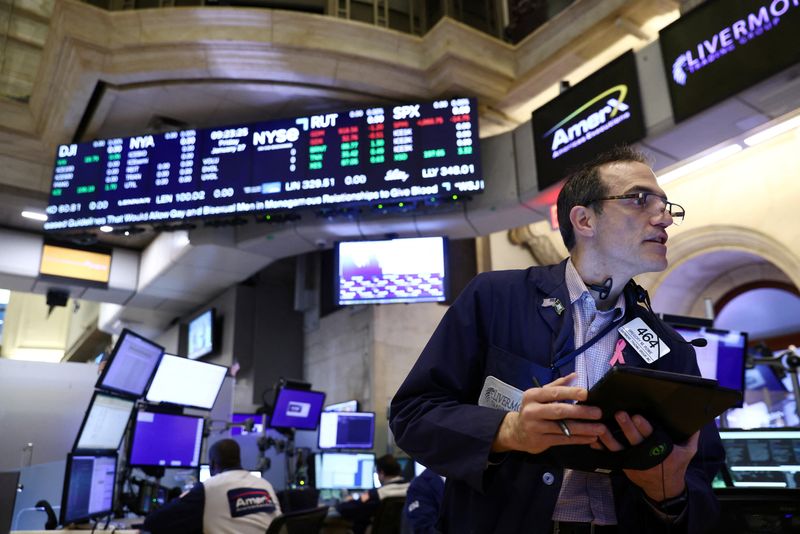 © Reuters. FILE PHOTO: A trader works on the trading floor at the New York Stock Exchange (NYSE) in New York City, U.S., January 27, 2023. REUTERS/Andrew Kelly/File Photo
© Reuters. FILE PHOTO: A trader works on the trading floor at the New York Stock Exchange (NYSE) in New York City, U.S., January 27, 2023. REUTERS/Andrew Kelly/File Photo
By Lewis Krauskopf, Shreyashi Sanyal and Johann M Cherian
(Reuters) - Major U.S. stock indexes ended lower on Friday after surprisingly strong jobs data sparked concerns about aggressive Federal Reserve action, while investors digested a mixed bag of megacap company earnings reports.
The S&P 500 still posted a gain for the week, which included a string of major market events, and stood not far from five-month highs. The Nasdaq tallied its fifth straight weekly rise, its longest such streak since late 2021.
U.S. job growth accelerated sharply in January, with nonfarm payrolls surging by 517,000 jobs, well above an estimate of 185,000. The unemployment rate hit a more than 53-1/2-year low of 3.4%.
In another sign of economic strength, U.S. services industry activity rebounded strongly in January.
Investors have been balancing hopeful signs that the economy could avoid a feared recession against concerns about how long the Fed will keep interest rates high to rein in inflation. The S&P 500 gained earlier this week after comments that were more dovish than expected from Fed Chair Jerome Powell, who acknowledged progress in the fight against inflation.
The jobs report "was an incredible surprise and it raises a lot of questions about what the Fed is going to do next,” said Kristina Hooper, chief global market strategist at Invesco. “What I think is causing some of the volatility is markets trying to make sense of how the Fed will perceive this.”
The Dow Jones Industrial Average fell 127.93 points, or 0.38%, to 33,926.01, the S&P 500 lost 43.28 points, or 1.04%, to 4,136.48 and the Nasdaq Composite dropped 193.86 points, or 1.59%, to 12,006.96.
For the week, the S&P 500 rose 1.6%, the Dow slipped 0.15%, and the Nasdaq gained 3.3%.
Wall Street's main indexes have had a solid start to the year as tech and other stocks that struggled in 2022 have rebounded, fueled by hopes that the Fed's rate hikes would soon end and the economy might be able to navigate a soft landing.
“So many things were trading at bargain-basement prices three, four months ago," said Eric Kuby, chief investment officer at North Star Investment Management Corp. "That has gone away... I think we are in a fair game now.”
On Friday, investors were also digesting another heavy batch of corporate results.
Shares of Apple (NASDAQ:AAPL), the largest U.S. company by market value, rose 2.4%. The company forecast that revenue would fall for a second quarter in a row but that iPhone sales were likely to improve as production had returned to normal in China.
Shares of Amazon (NASDAQ:AMZN) slumped 8.4% as the company said operating profit could fall to zero in the current quarter as savings from layoffs do not make up for the financial impact of consumers and cloud customers clamping down on spending.
Alphabet (NASDAQ:GOOGL) shares dropped 2.7% after the Google parent posted fourth-quarter profit and sales short of Wall Street expectations.
In other corporate news, Ford Motor (NYSE:F) shares slid 7.6% after the automaker predicted a difficult year ahead.
Declining issues outnumbered advancing ones on the NYSE by a 2.82-to-1 ratio; on Nasdaq, a 1.66-to-1 ratio favored decliners.
The S&P 500 posted 16 new 52-week highs and one new low; the Nasdaq Composite recorded 127 new highs and 16 new lows.
About 12.8 billion shares changed hands in U.S. exchanges, compared with the 11.9 billion daily average over the last 20 sessions.

